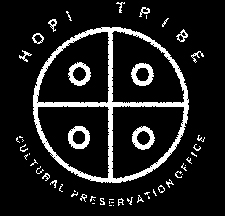



Kykotsmovi, Arizona-- The Hopi language has always been an integral and vital part of Hopi culture. It is the wellspring of Hopi ceremonial life; it expresses kinship and clan relationships; it holds our people's history. It is the foundation of creative expression and cultural continuity that stretches back at least one thousand years. Currently, there are approximately 10,000 individuals enrolled in the Hopi Tribe. Approximately 11,000 people live on the Hopi Reservation in 12 independent villages. Here, the Hopi people maintain their tradition of dry farming, food preparation, ceremonial life, and storytelling in an ancient tongue.
In recent times, however, the continuity of that tradition has been threatened. In a variety of public forums and in private conversations, many Hopi people have expressed the fear that the younger generations were losing the ability to speak Hopi, and with it, the centuries-old heart of the Hopi way of life. In 1997, with a grant from the Administration for Native Americans, the Hopi Cultural Preservation Office conducted the Hopi Language Assessment Project (HLAP). The goal of the project was to quantify, fo rthe first time, the current status of Hopi language fluency in the community. This data was then used to develop a comprehensive plan for preserving the Hopi language.
The Hopi Language Education and Preservation Plan calls for a comprehensive, reservation-wide language instruction program. The survey results and community input show that the Hopi people believe that Hopi should be taught at home and in the villages by knowledgeable fluent speakers. They also want school-based programs for their children. They want assistance, training, and teaching materials so they can teach their own children and grandchildren how to speak Hopi. They want this home and village based instruction to be supported and reinforced by the educational system.
By developing, implementing, and evaluating pilot programs in different settings and among different ages, the Hopilavayi Project will give the community and school system the experience, resources and flexibility to design grassroots programs for language revitalization that fits their own needs.
For more details on the project, please contact the Hopilavayi Project at the Hopi Cultural Preservation Office, (928) 734-3612.